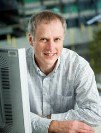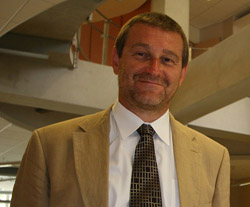Calit2-Affiliated Computer Scientists Recognized for Contributions in Computer Systems Security, Bioinformatics, Cyberinfrastructure Software
San Diego, December 8, 2010 -- For contributions to bioinformatics and computer systems security, computer science professors Pavel Pevzner and Stefan Savage from the University of California, San Diego are among 41 computer scientists named as 2010 ACM Fellows. Professors Pevzner and Savage are from the Department of Computer Science and Engineering (CSE) at the UC San Diego Jacobs School of Engineering.
|
The ACM, or Association for Computing Machinery, is the world’s largest educational and scientific computing society. The ACM Fellows Program, initiated in 1993, celebrates the exceptional contributions of the leading members in the computing field.
“This recognition reflects the tremendous talent pool and quality of research efforts that the department has built in growing areas of computer science – in particular in computer systems security and bioinformatics. This work lays important intellectual foundations for tremendous impacts of computing on society and human welfare,” said Rajesh Gupta, Professor and Chair, Department of Computer Science and Engineering at UC San Diego.
Computer science professor Stefan Savage is being recognized by the ACM “for contributions to large scale systems and network security.”
Pavel Pevzner, also a computer science professor at UC San Diego, is being recognized by the ACM “for contributions to algorithms for genome rearrangements, DNA sequencing, and proteomics.”
Large-Scale Systems and Network Security
|
Savage is part of the Systems & Networking and Security research groups in the Department of Computer Science and Engineering at UC San Diego. Savage is also the Acting Director of the UC San Diego Center for Networked Systems. His interests range from the economics of e-crime, to characterizing availability, to automotive systems to routing protocols and data center virtualization.
|
UC San Diego computer science professor Pavel Pevzner’s work has focused broadly on algorithmic aspects of bioinformatics. Bioinformatics has become a part of modern biology and often dictates new fashions, enables new approaches, and drives further biological developments. Pevzner’s work focuses of DNA sequencing, proteomics, and genome rearrangements, the key areas of algorithmic biology.
He authored influential graduate and undegraduate textbooks on bioinformatics algorithms and is now interested in new approaches to interdisciplinary computer science education and introducing computer science to education of biologists.
Pavel Pevzner is the Ronald R. Taylor Professor of Computer Science at UC San Diego; Director of the NIH Center for Computational Mass Spectrometry; and a Howard Hughes Medical Institute (HHMI) Professor.
ACM Fellows
The 2010 ACM Fellows have made advances in technology and contributions to the computing community that are meeting the dynamic demands of the 21st century, according to ACM President Alain Chesnais. “Their ability to think critically and solve problems creatively is enabling great advances on an international scale. The selection of this year’s Fellows reflects broad international representation of the highest achievements in computing, which are advancing the quality of life throughout society,” said Chesnais.
Fellow is the ACM’s most prestigious member grade, recognizing the top 1 percent of ACM members for their outstanding accomplishments in computing and information technology, and/or outstanding service to ACM and the larger computing community.
The 2010 ACM Fellows, from the world’s leading universities, corporations, and research labs, achieved accomplishments that are driving the innovations necessary to sustain competitiveness in the digital age. See the full list of 2010 ACM Fellows.
Pevzner and Savage join a distinguished list of ACM Fellows from the Department of Computer Science and Engineering at UC San Diego that includes: Fran Berman, Andrew Chien, Jeanne Ferrante, Ron Graham, Sid Karin, Venkat Rangan, George Varghese, and Victor Vianu.
Media Contacts
Daniel Kane dbkane@ucsd.edu, (858)534-3262
Related Links
Stefan Savage Website
Pavel Pevzner Website
ACM
Center for Networked Systems




